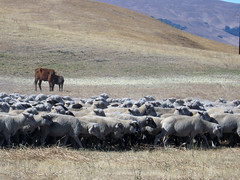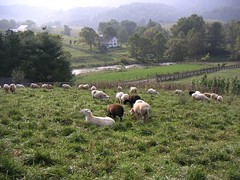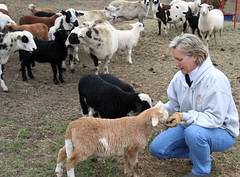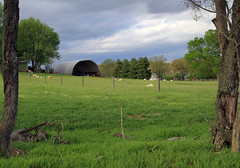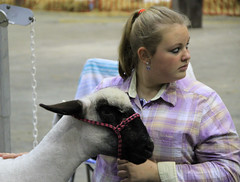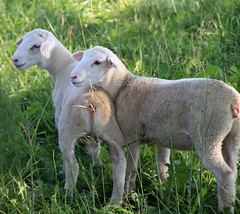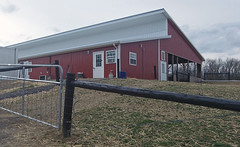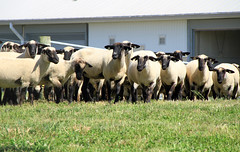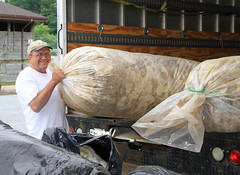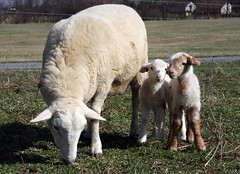- Sheep 201 Index
- Other web sites
Tax implications
There can be numerous tax advantages to raising sheep or engaging in similar farming activities. Every state offers some type of tax incentive to protect land from development. Farmers are usually exempt from sales tax on items purchased for use in their farm business. Expenses associated with the farm enterprise can be written off against ordinary income.
Real Estate Transfer Taxes
A realty transfer tax is a state and local tax assessed on real property when ownership of the property is exchanged between parties. All types of real property, including residential, commercial, and agricultural, are subject to the realty transfer tax.
Some states wave the agricultural transfer tax if the purchaser of the land signs a "declaration of intent" specifying that the land will remain in agricultural use for at least five consecutive tax years. Loss of the use assessment during the 5 year period would result in the tax liability, plus penalty, being imposed.Agricultural Land Tax Assessment
If land is "actively" used for agricultural purposes, its value is assessed according to its current use and not according to its current market value. Thus, agricultural producers pay lower property taxes. Requirements for agricultural land assessment (and enforcement of those regulations) vary by state and county.
Factors which determine eligibility have to do with the numbers of acres in active farming, gross income from the land, and percent of income from farming -- and different combinations of those factors. For example, in Maryland, for land to be considered agricultural use, it should consist of least three (3) acres and the farming operation should generate a minimum gross income of $2,500.Sales and Use Tax Exemption
There are agricultural exemptions for sales and use tax. Sales tax is waived for purchases and rentals of farm equipment, livestock, feed, bedding and supplies used in the production of agricultural products
The raising of livestock by members of youth organizations, such as 4-H, for agricultural educational purposes also qualifies for a sales tax exemption. To qualify for an agricultural sales and use tax exemption, it may be necessary to apply with a state agency. In other states, all that's necessary is a signed statement with the vendor.
Farming "For Profit"
To qualify for favorable tax treatment as a farmer or sheep producer, you must establish that you are in business to make a profit. A farming operation is assumed to be "for profit" if it has reported a profit in three (3) of the last five (5) tax years, including the current year (IRS code, section 183). If you fail the three years of profit test, you may still qualify as a "for profit" enterprise if your intention is to make a profit.
"per profit" after failing the initial "for profit" test
- You operate your farm in a businesslike manner. (As manager, do you have a business plan, have you set goals, do you keep records?)
- The time and effort you spend on farming indicate that you intend to make a profit. (Do you spend sufficient time and energy on attaining that goal?)
- You depend on income from farming for livelihood. (Here, full-time farmers have an advantage, but the income issue relates more to the farmer's need for deductions than his or her dependence on farm income. Farmers having off-farm jobs to supplement their income depend on their farm income, too.
- Your losses are due to circumstances beyond your control or are normal in the start-up phase of farming.
- You change your methods of operation. (You could begin to winter calves rather than sell them in the fall or finish cattle to slaughter weights; the income could be delayed several months.)
- You and your advisers have the knowledge to carry on the farming activity as a successful business. (Attending continuing education classes can offset perceived weaknesses in this area.)
- You made a profit in similar activities in the past.
- You made a profit farming in other years and can document how much you made.
- You can expect to make a future profit from appreciation of the assets used in the farming activity.
No single factor indicates whether an activity is carried on for profit or not. All factors are considered.
Tax Write-off
Like other forms of agricultural production, sheep raising can be a tax write-off. Expenses from the sheep enterprise may be deducted from your tax return to offset ordinary income. Expenses that can be deducted on your taxes include feed, veterinary costs, bedding, breeding fees, ram replacement, land and equipment rental, hired labor, custom work, supplies, marketing and transportation costs, memberships, education, and depreciation. It is necessary to file a schedule F in order to deduct expenses from a sheep operation.
Depreciation
Depreciation is a cost of doing business. It is the depletion of capital assets. The value of goat breeding stock may be deducted utilizing two different methods of depreciation. The straight line method deducts 20% of the animal's value per year, while the accelerated method allows a more rapid rate of depreciation.
However, you cannot depreciate breeding animals that you raised, because the costs associated with raising them are deducted as expense items: feed, medicine, etc. Buildings, fencing and equipment may also be depreciated. The rate of depreciation depends upon the useful life of the asset, which varies from three (3) to forty (40) years.Section 179
The Section 179 deduction allows you to deduct the full cost of a qualifying asset in the year it was placed into service rather than to depreciate it out over several years. There are caps to the total amount written off and limits to the total amount of equipment purchased.
Paying Taxes
If you make a profit on your sheep enterprise, you have to pay income taxes and self-employment taxes on the income unless it is offset by losses in another business.Income Taxes
If you are in the trade or business of farming, you must complete and file schedule F, "Profit or Loss from Farming," along with IRS Form 1040. Schedule F is very similar to Schedule C for small business owners. For income tax purposes, farmers may use either a cash or accrual method of accounting. Income averaging is a method of reducing the annual tax burden.Self-Employment Tax
Self-employment tax (SE tax) is a social security and Medicare tax primarily for individuals who work for themselves. It is similar to the social security and Medicare taxes withheld from the pay of most wage earners. You usually have to pay SE tax if you are self-employed. You are usually self-employed if you operate your own farm on land you either own or rent.
The self-employment tax rate is 15.3%. The rate consists of two parts: 12.4% for social security (old-age, survivors, and disability insurance) and 2.9% for Medicare (hospital insurance). You must pay SE tax and file Schedule SE (Form 1040) if your net earnings from self-employment were $400 or more.Record keeping
Record keeping is an important aspect of taxes and the primary reason farm records are kept. There are many suitable record keeping systems. Ideally, the farm has a separate check book. A business checking account provides a good record of income and expenses. Transactions can be entered into a journal or ledgers.
Nowadays, most transactions are recorded electronically. There are many suitable programs. Quicken and Quickbooks are especially popular among farmers. Supporting documents need to be stored in a safe place. In generaly, these documents must be kept for at least three years from when the tax return was filed. Most farmers do not file their own taxes; they have an accountant.
Hobby (not-for-profit farming)
If you raise sheep with no intention of making a profit, it is a hobby. Any income from a hobby farm is reported on the first page of IRS form 1040 under "other income," not on a schedule F. Expenses of a hobby can only be deducted on schedule A, itemized deductions. Hobby losses cannot be used to offset unrelated income.
4-H and FFA Projects
If an individual participates in a 4-H Club or FFA project, any net income received from sales or prizes related to the project may be subject to income tax. Net income should be reported on the appropriate IRS form. If the project is primarily for educational purposes and not profit, the net income is not subject to self-employment tax.
Taxes are complicated and the tax code is constantly changing. Farmers should consult with tax accountants for the most up-to-date information on farm taxation and reporting.
Consult an accountant or refer to IRS publication 225 Farmer's Tax Guide for answers to your tax questions.
Tax implications
<== SHEEP 201 INDEX
Copyright© 2021. Sheep 101 and 201.

